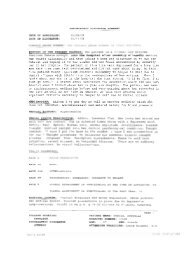C - Organized Mobbing
C - Organized Mobbing
C - Organized Mobbing
Create successful ePaper yourself
Turn your PDF publications into a flip-book with our unique Google optimized e-Paper software.
514 CHAPTER NINE<br />
knots. Visiting Berlin from his native Saxony to interview for<br />
a job as a<br />
teacher. he got embroiled in the June 17,1953 uprising, landing him in a<br />
Berlin refugee carrp. where he, barely out of school, dreamed ofstarting all<br />
over again as a lumberjack in Canada. Being too young for the canadian<br />
recruiters he ended up mining the Ruhr lralley for coal while, to the chagrin<br />
of his employers, spreading enthusiasm for his communist ideas as a union<br />
organizer. Married to a West German comrade, he eventually returned<br />
to<br />
Leipzig. Back home he again became active as a union representative fighting<br />
against the privileges of management in the company he worked for<br />
This did not go down all too well with the local party apparatus, however;<br />
where he earned the reputation of being a quarrelsome and unruly comrade,<br />
Always on the lookout for opportunities to be in touch with the big wide<br />
world he befriended the first Cuban students who came to Germany in the<br />
mid-1960s. Through them he became interested in Chinese socialism just at<br />
the time when such interests came to be frowned upon by the party leadership.<br />
A packet with brochures sent to him from the Albanian embassy (then<br />
a Chinese all?-) got him into serious trouble. Worse, even though banned<br />
from traveling to Czechoslovalua, he got caught in Bratislava just as Russian<br />
tanks were rattling in. Even though the ensuing chaos allowed him to sneak<br />
back undetected across the border, the careless telling of his tale in a pub<br />
finally landed him in prison. Luckily he had to stay there only for a relatively<br />
short ~eriod of time thanks to the connections of his mother and the post-<br />
1968 overcrowding. To him, the Stasi's call in the 1970s created echoes of spy<br />
novels, and never shy to embark on an adventure, he was happy to oblige, all<br />
the more so since the first task seemed interesting enough: visiting openings<br />
of art exhibitions, readings, and similar events at Western embassies.<br />
LVerner Miiller (name changed) was approached by the Stasi with an entirely<br />
different profile of work in mind. He had just begun to study philosophy<br />
and economics with vague notions that he would pursue a career in some<br />
official trade or policy function that would take him abroad. In the context<br />
of these plans, the request to work for the Stasi seemed to him as a test of<br />
loyalv and beyond that simply as part of the deal. When these original career<br />
plans did not come to fruition his connection to the Stasi lay dormant,<br />
simply because he lost his relevance for the secret police's foreign espionage<br />
operations. This changed years later when he was working for the academy<br />
of sciences in the department of critical Marxist philosopher Peter Ruben<br />
(Rauh 1991). When Miiller was dismissed from the academy and thrown out<br />
of the party alongside Ruben, the Stasi approached him again, this time with<br />
domestic spying work in mind. He appeared as a perfect candidate for stasi's<br />
efforts to introduce informants into Berlin's dissident circles.<br />
The cases of Wolfgang Wolf and Ibrahirn Bohme are more obscure. The<br />
unsteady lives of both men, moving in and out of intense professional and'





